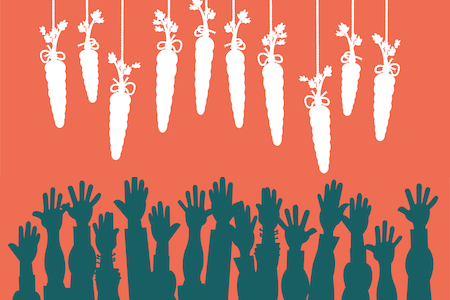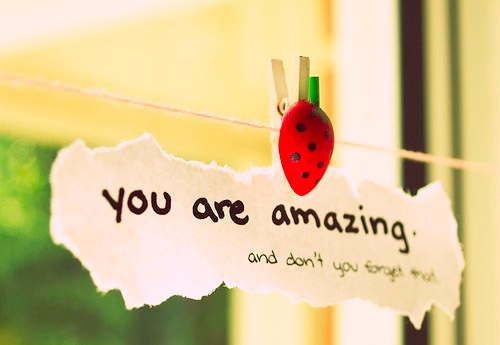A sales team needs cohesion to motivate them to work and achieve targets. That’s what we discussed in the second part of this "Build, Retain and Develop Your Sales Force" blog series. Nevertheless, while the team as a whole must not be ignored, experts advise that personal motivation should also be considered due to its positive effect on the salesperson’s drive to achieve and to even go the extra mile for the job. That also deeply emphasises the importance of Emotional Intelligence to business performance.
When it comes to salespeople, a stereotype exists that they are only interested in cash rewards. That’s why the word “commission” may be the only thing popping up in your mind when we mention motivating and rewarding salespeople. But is it the only possible and effective motivator? And is it necessary to do something else if you have already provided a high commission rate?
You might have heard of “carrot and stick,” a well-known approach in international relations that refers to a policy of offering rewards (carrot) or punishment (stick) to bring about behaviours.
Yet in today’s business world, the employee motivation's approach has become much more complicated than only using force or incentives. Still, incentive programmes, or the “carrot,” have proven to be effective across organisations.
According to the US Incentive Federation (2), a well-built incentive programme can improve performance by an average of 22%, and a programme that runs for more than six months can help create a performance increase of 30% to 44%.

Are those numbers convincing? We’re not suggesting you completely remove commission plans to motivate salespeople. Those will still be there, but you should consider the following as parts of an effective incentive programme as well:
Motivation - Something other than money
In Maslow’s Hierarchy of Needs, the Physiological and Safety requirements can obviously be fulfilled with money as a means. This leads to the misconception that money is the best “carrot” of all, and companies might make the mistake of designing sales incentive programmes with only monetary rewards, but in fact, if we look at the rest of Maslow’s Hierarchy, we see that salespeople are not just concerned with money.
While commission should be a fixed part of your incentive programme, you can come up with a wide range of other incentives to motivate your salespeople. Certain perks, such as free lunch or paid time off, further training courses on sales skills or any creative incentive idea, can be implemented with the aim of making salespeople think about their success on a personal level as well as among their peers and team as a whole.
Taking advantage of the competitive spirit of salespeople, you can even consider organising contests to see who delivers the most demos or makes the most calls in a month. These kinds of contests (which challenge but don’t demand) will help promote healthy competitions within the team and motivate salespeople to reach higher goals.
Recognition as incentives
Using the same thinking as above, you’ll also need to offer regular recognition to boost a salesperson’s drive. That’s why “reward” and “recognition” usually go together, as you cannot create a complete programme with either alone.
You might ask, “What should I congratulate them on?” Recognition should not be limited to winning big deals; instead, you can extend praise to your team members for obtaining a necessary certificate or for simply making the most calls in the month.
Furthermore, the forms of recognition should also vary, from dropping an email to the team or nominating one member (or a group of team members) to be the company’s employee of the month, to mentioning an achievement during a company-wide monthly gathering.

Moreover, you should promote a “peer recognition” culture within your team. Your team members should be encouraged to congratulate each other on their successes as well as to notify managers of others’ achievements, in case they did not have the chance to observe them. This way, you will strengthen relationships among them and increase the overall team morale.
Tailor the reward and recognition to the salesperson’s motivators
According to Holland’s person-environment typology theory (3), “one’s motivation for work can be associated with various interest categories.” This means that different people are motivated by various factors.
Upon applying this to your sales team members, you will realise the need to understand them to identify what motivates them to work and contribute, and from that, you can tailor rewards and recognition to suit their interests.
Total-person assessment tools might help in this situation if you need scientific evidence of what their motivators might be. Alternatively, you can simply ask your team members in private to honestly address their concerns. Possible motivators might include:
- Bonuses and commission
- Training courses or certification opportunities
- Authority
- Membership in a prestigious business group
- Practical gifts or upgrading their work facilities

No matter how much the interests might vary, it is essential that you know your salespeople’s personalities for effective rewards and recognition.
The term “motivational intensity” indicates whether individuals prefer receiving external recognition or motivation inside of themselves. However, your sales team members' personalities will not affect the availability of an incentive programme with both monetary and non-monetary methods to push them forwards and strive for excellence.
Up till now, you have recruited right, created a bond within your team and motivated your salespeople to keep on doing well. So, what’s next? You cannot just leave your team alone to do anything or go anywhere. Not caring about their development in their sales positions leads to many negative consequences that sales managers do not want to encounter. We will discuss the importance of developing salespeople in the next, and last, part of this blog series about Building, Retaining and Developing Your Sales Force.
If you find the blog informative, please subscribe to TRG’s Blog in order to get notifications on new updates.
 English
English  Vietnamese
Vietnamese 

